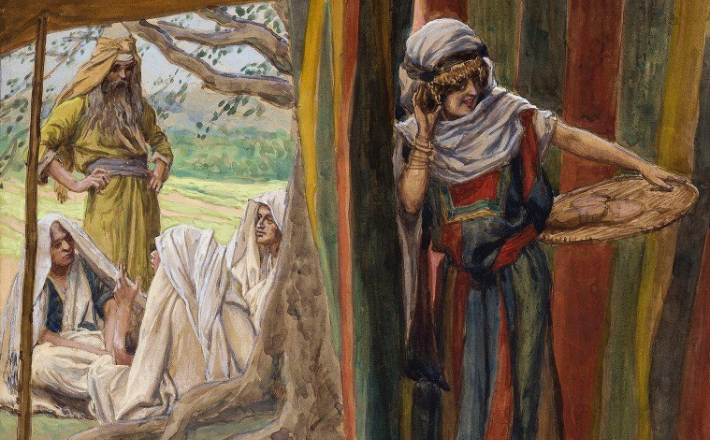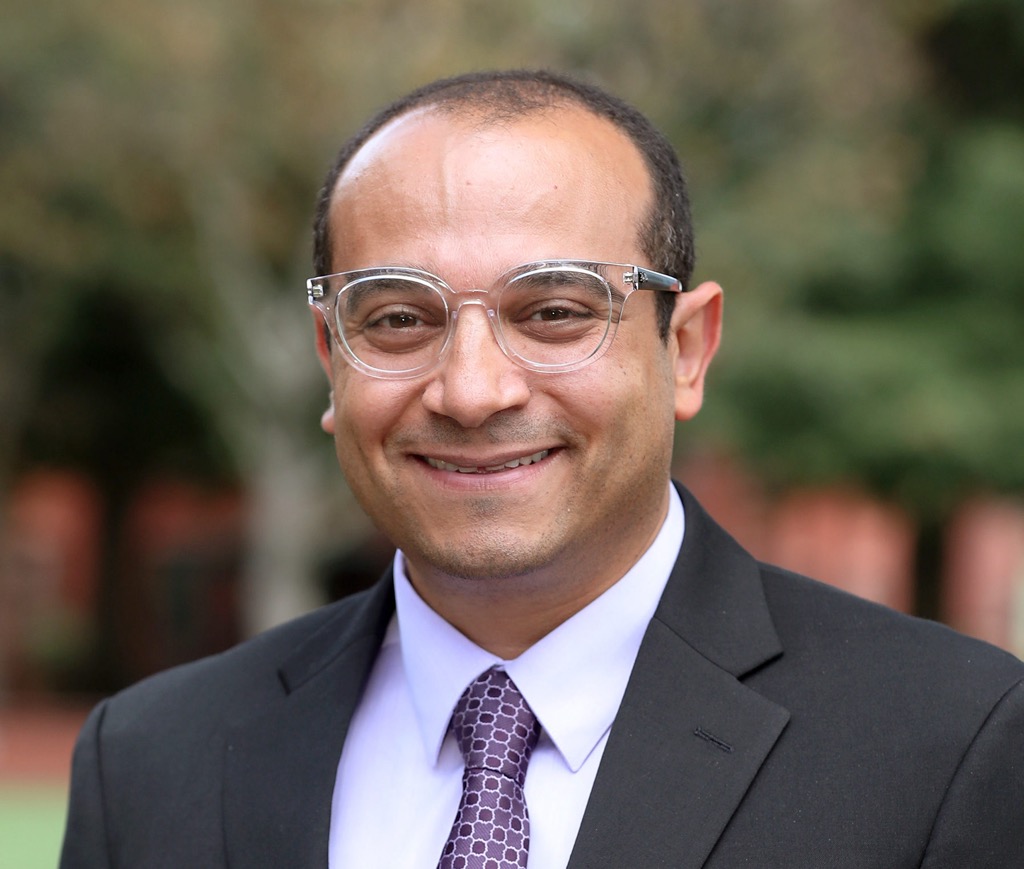Commentary on Genesis 18:1-15; 21:1-7
These two texts narrate the promise and the fulfillment of the wondrous birth of Isaac to the aging Abraham and Sarah. As much as this account offers a reiteration of the divine promise to Abraham that he and Sarah will have descendants and a people, the plot seems to have finally reached its climax in unique ways.
For one, the LORD speaks of a very specific time. In a year, Sarah and Abraham will be holding their newborn in their hands.
Second, this account gives Sarah a more prominent role and a voice in the promise stories. Earlier she was only mentioned as the bearer of the child, but here, however, she listens, laughs, argues, marvels and muses at the promise and its fulfillment.
Third, these episodes reveal something about the connection between the notions of hospitality, food, and the promise. This is the closest God gets to Abraham; God the guest responds to Abraham’s hospitality with the most precious gift that Abraham and Sarah have been dreaming of for a long time. God also, for the first time, interacts with Sarah directly.
Hospitality and the promise (Genesis 18:1-8)
Early on in the story, the narrator reveals to the reader that what Abraham saw as three people is in fact the mysterious appearance of the LORD. Divine revelation and human perception are bound in a relational way as the narrator uses the same Hebrew verb ra’ah in verses 1 and 2 once with God as the subject and another with Abraham as the subject. Even though later interpreters impose a trinitarian understanding on the three people that Abraham saw, this is not the main concern of the text.
The main point of the text is that Abraham—not knowing who these wanderers are—offered the most generous hospitality to strangers. Abraham’s generosity is underlined by the physical activity that he performed, the amount and diversity of cuisine offered to the guests, and the leisure that they ended up enjoying at the oaks of Mamre, which is near Hebron. The ninety-nine-year-old Abraham’s athletic abilities are marvelous; he ran, bowed down, came up with a menu and a hospitality plan on the spot, hurried, carried, and stood to serve his guests. In a typical manner to the desert context, he offered water to wash the feet of the guests. Through the tireless work of Sarah and the worker, the meal included milk, meat, and bread. Little does he know that these guests are not less than an embodiment of the divine. He had no idea that when he offers water, food, shade, and rest, he, and his wife Sarah, will receive a gift that greatly exceeds what they had offered.
The categories of host and guest are complex in this story. The God who is choosing to be a wanderer and a stranger, gives the ultimate gift to their hosts. Even though Abraham is portrayed as the outright host of the divine, he and Sarah generously receive when they take the risk of welcoming strangers to their tent. Unsettling the notions of host and guest is signaled by narrative details and gaps. For example, when Abraham first sees the strangers, he was sitting at the opening of the tent, which marks a liminal space between insider and outsider.
After Abraham offers them the food, the guests are seated while the host remains standing so that he would fulfill their needs. Further, while the guests seem to be unknown to Abraham, they surely know Sarah his wife, since they ask for her; they know what Abraham and Sarah expect and long for. And apparently, even though they are sitting away from the tent they are able to know what happened not only in the tent but even what happened inside Sarah herself when she laughed. Thus it seems from these details and gaps in the narrative that this is not a simple host-guest scenario. The mutuality of giving and receiving and the reversal of roles that allow each party to be simultaneously a guest and a host bring God’s plans for this family a step further. When the migrants Abraham and Sarah offer generously, they receive the gift of building a family that gives them hope of continuity and survival in the land of their sojourn.
Questions, laughter, wonder (Genesis 18:9-15 and 21:1-8)
The encounter between God and humans that involves an honest space for questions and argument is not necessarily a sign of lack of faith but rather it could very well be an opportunity for laughter and wonder to merge in their faith journey. The all-knowing deity, who will soon announce that a child will be born in a year, does not know where Sarah is. As the three mysterious guests ask “where is Sarah?” (18:9) they center Sarah at the heart of the conversation and they signal the relational nature of God’s engagement with the couple.
Then when the time specific promise of the birth of a child is pronounced, Sarah raises questions about the possibility of the fulfillment of the promise (18:10-12). She and the narrator agree that hers and Abraham’s age makes it impossible. While the narrator focuses on Sarah’s menopause, Sarah’s way of protesting focuses on the absence of sexual pleasure. From the opening of the tent, that liminal space, Sarah breaks social and theological boundaries. Through laughter Sarah is naming the loss of pleasure in the process of waiting for the promise to be fulfilled. Through laughter she is protesting the reduction of sexual pleasure that resulted from God’s delay in fulfilling the promise.
Laughter becomes the mark of the child of the promise. Sarah’s laughter, which seems to have irritated God, is not a sign of doubt. Instead, it is a sign of this woman’s ability to protest. Marginalized people sometimes confront the systems from their liminal spaces by making jokes or memes. Laughing to herself she is privately trying to make sense of what does not make sense about this promise at this time.
Sarah’s laughter is what breaks open the intense dialogue with God. Initially, God does not address Sarah directly. Abraham was the mediator. But eventually the exchange got more intense and direct. Through laughter and questions Sarah gives voice to the repressed human perception of reality. Interestingly, God also puts the affirmation of the fact that God can make miracles in the form of a question, which essentially means that God expects a human response “is it too wonderous?” Sarah asks questions and God asks questions. Possibly offended by Sarah’s laughter, not appreciating a good joke, God pressed saying: “no! you laughed!” Does God desire for Sarah own her voice of protest? Such a protest that might have eventually encouraged Abraham and God to have an argument about Sodom.
At any rate, Sarah’s laughter, even though confronted, it is not repressed and does not cause a loss of the promise. Interestingly, when the child is born, he is given the name Isaac, which comes from the same Hebrew word (tshq) that describes Sarah’s reaction to God’s promise. Indeed, when God fulfills the promise and Sarah delivers a child, laughter is described as a divine gift to her (21:6). But without her courageous response to God’s unfulfilled promise, pleasure and laughter might have become secondary to the miraculous birth of a child at an old age. The miracle is not only the birth of a child at that age, but also that there is laughter and wonder that results from taking God and God’s words seriously even in the form of asking questions and wondering. As a model of protest through laughter, Sarah wants others to do the same: Now Sarah said, “God has brought laughter for me; everyone who hears will laugh with me.” And she said, “Who would ever have said to Abraham that Sarah would nurse children? Yet I have borne him a son in his old age” (21:7-8).
Caution
As this text celebrates Abraham’s generous hospitality to his guests and as we celebrate Sarah’s courageous laughter, it is necessary to problematize the ways they have not shown hospitality to Hagar and Ishmael. These celebrated faith figures have acted oppressively and out of fear towards these two marginalized individuals. The God who agreed with Sarah and Abraham to cast Hagar and Ishmael away, blessed the Egyptian and her son and accompanied them in the desert (21:9-21).
PRAYER OF THE DAY
God of promise, Abraham scoffed and Sarah laughed when they were told of your plans for them and their family. Yet you remained faithful to your promise, and gave them a son, Isaac. Help us to trust in your promises for our lives, and to live according to your will. Amen.
HYMNS
Lord, teach us how to pray aright ELW 745
Go, my children, with my blessing ELW 543, GG 547, NCH 82, TFF 161
God, Who Stretched the Spangled Heavens ELW 771, GG 24, H82, NCH 556, UMH 150
Pass Me Not, O Gentle Savior NCH 551, UMH 351, TFF 150
CHORAL
Rejoice in the Lord Alway, Henry Purcell


September 17, 2023